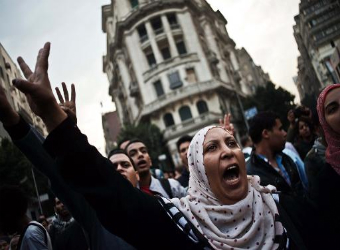Restrictions on protests and hefty jail terms for girl demonstrators are reviving Egypt’s autocratic past, say activists and erstwhile supporters of the government that replaced Islamist president Mohamed Morsi after he was overthrown.
The military, the real power behind the civilian government it installed after Mori’s ouster in July, remains wildly popular, and many Egyptians, troubled by a stagnant economy, care more for stability than for rowdy protests.
But even supporters of the new government, and secular activists who viewed it as a lesser evil after Morsi’s divisive rule, say it has gone too far by banning all but police-sanctioned protests.
And proving too much for some was the sight on Wednesday of more than a dozen white-clad women and girls in an Alexandria courtroom cage, as they were sentenced for up to 11 years in jail for taking part in a violent protest in October.
Amnesty International reacted on by saying they should never have been arrested and called for their immediate and unconditional release.
It said their imprisonment sends a “strong signal that there will be no limit to the authorities? efforts to crush opposition and that no one is immune to their iron fist.?
Applying the new law on Tuesday, police violently dispersed two small protests by secular demonstrators, arresting some of Egypt’s most prominent female activists before dumping them on a desert road at night.
The protests were against a clause in the draft of a new constitution that would allow the military to try civilians before summary tribunals.
Prosecutors have ordered the arrest of two leading secular activists and dissidents under Morsi — Alaa Abdel Fattah and Ahmed Maher — for allegedly inciting the protests.
“Deja vu, I’m about to hand myself in to the authorities again on Saturday,” Abdel Fattah wrote on Facebook, but he never got the chance to do so.
His wife wrote on Twitter that security services arrested him at their home in western Cairo on Thursday and had beaten her during the process.
Abdel Fattah had been already arrested under Morsi’s predecessor Hosni Mubarak, then under the transitional military junta that ruled after Mubarak’s overthrow and finally during Morsi’s year in office.
New law could provoke, rather than prevent violence
In the months since the army removed Morsi, more than 1,000 of his supporters have been killed in a police crackdown, and thousands arrested.
But the latest restrictions have galvanised secular activists.
Hamdeen Sabbahi, a former presidential candidate and a leading dissident under Morsi, called on the interim president to pardon the girls and repeal the new law governing protests.
“I call on president Adly Mansour to use his powers to pardon the girls sentenced to 11 years,” he wrote on Twitter.
Mohammed Sayyed, a cafe waiter in the upscale Cairo suburb of Maadi, said the harsh sentences, which may be overturned or reduced on appeal, left some Egyptians who had protested against Morsi concerned that their rights were being stripped away.
“What this means is that we as Egyptians have no rights,” he said.
Gehad Gamal, who works for an insurance agency, said the verdict revived memories of Mubarak, who was overthrown in 2011.
“Those sentences took us back to Mubarak?s era, with restrictions on political rights,” she said, adding that she too had opposed Morsi.
The government, which has not commented on the sentences, says it will not reconsider the protest law for now and plans to implement it to the letter, a cabinet official told AFP.
But analyst Issandr El Amrani says the increasing backlash may strain the unlikely coalition of security hawks and liberal democrats appointed by the military to lead the country into elections next year, and could also provoke the very unrest the law aims to quell.
“This strains relations inside the cabinet,” said El Amrani, north Africa project director for the International Crisis Group.
“Rather than consolidate the transition, it weakens it. It alienates even supporters of the government,” he said.
Source: AFP


